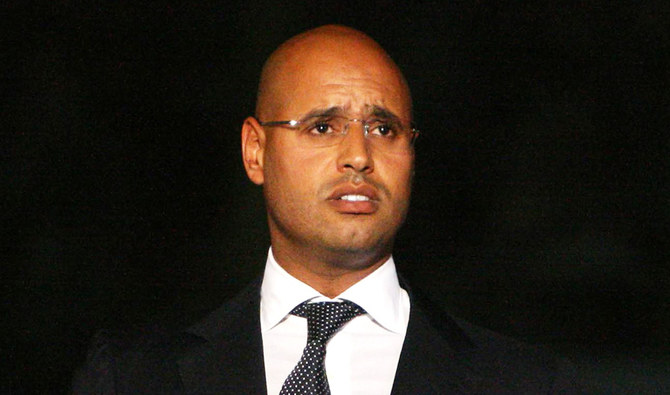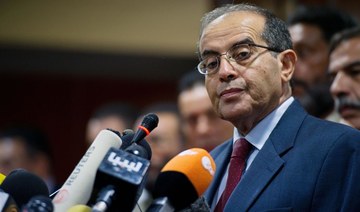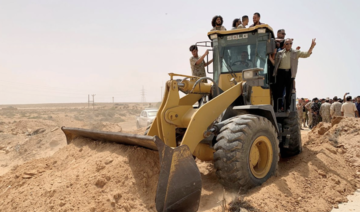TRIPOLI: Seif Al-Islam, the son of slain leader Muammer Qaddafi, wants to “restore the lost unity” of Libya after a decade of chaos and does not exclude standing for the presidency.
He spoke in a rare interview, given to the New York Times at an opulent two-story villa inside a gated compound at Zintan in the west of the North African country.
For years, mystery had surrounded the precise whereabouts of a man wanted for war crimes by the International Criminal Court (ICC).
The 49-year-old, who before 2011 had been seen as his father’s presumed successor, said politicians in the decade since have brought Libyans “nothing but misery.”
“It is time for a return to the past. The country — it’s on its knees ... There’s no money, no security. There’s no life here,” Seif Al-Islam said in his first appearance in years.
After four decades in power, Muammer Qaddafi and his relatives were the target of a popular uprising in 2011.
Three of the dictator’s seven sons were killed, but the fate of Seif Al-Islam was unknown.
He was captured by a Libyan militia in November 2011, days after his father was killed.
Four years later, a Tripoli court sentenced him in absentia to death for crimes committed during the revolt.
The ICC has repeatedly asked for him to be handed over for trial.
Until the interview, Seif Al-Islam had not been seen or heard from since June 2014, when he appeared via video link from Zintan during his trial by the Tripoli court.
Seif Al-Islam said in the interview that he was a free man organizing a political return, and that his former captors “are now my friends.”
He told the paper the militiamen eventually realized he could be a powerful ally.
In recent years, Libya has been split between two rival administrations backed by foreign forces and countless militias.
In October, after forces of the Tripoli-based Government of National Accord (GNA) routed those of eastern military strongman Khalifa Haftar, the two camps agreed a cease-fire in Geneva.
The security situation has been slowly improving since.
A provisional government was agreed in March, and general elections are expected to take place on December 24.
Any possible return by Seif Al-Islam to Libyan politics would face hurdles, including his conviction by the Tripoli court and the ICC warrant for his arrest.
But the Britain-educated son of Muammer Qaddafi seems undeterred, according to the New York Times.
Seif Al-Islam said “he was confident that these legal issues could be negotiated away if a majority of the Libyan people choose him as their leader.”
The paper quoted him as saying: “I’ve been away from the Libyan people for 10 years. You need to come back slowly, slowly. Like a striptease. You need to play with their minds a little.”
Asked if it felt strange to seek shelter in Libyan homes when he was on the run in 2011, he was as enigmatic as some of the opinions expressed in his late father’s ‘Green Book’.
“We’re like fish, and the Libyan people are like a sea for us,” Seif Al-Islam replied.
“Without them, we die. That’s where we get support. We hide here. We fight here. We get support from there. The Libyan people are our ocean.”
Qaddafi’s son wants to restore lost unity of Libya
https://arab.news/cpjj4
Qaddafi’s son wants to restore lost unity of Libya

- It is time for a return to the past. The country — it’s on its knees ... There’s no money, no security. There’s no life here. Seif Al-Islam
Helicopter carrying Iran’s president suffers a ‘hard landing,’ state TV says without further details
Helicopter carrying Iran’s president suffers a ‘hard landing,’ state TV says without further details

- Ebrahim Raisi was traveling in Iran’s East Azerbaijan province
- State TV described the area of the incident as being near Jolfa
DUBAI: A helicopter carrying Iranian President Ebrahim Raisi suffered a “hard landing” on Sunday, Iranian state television reported, without immediately elaborating.
Raisi was traveling in Iran’s East Azerbaijan province. State TV described the area of the incident happening as being near Jolfa, a city on the border with with the nation of Azerbaijan, some 600 kilometers (375 miles) northwest of the Iranian capital, Tehran.
Raisi had been in Azerbaijan early Sunday to inaugurate a dam with Azerbaijan’s President Ilham Aliyev. The dam is the third one that the two nations built on the Aras River.
Iran flies a variety of helicopters in the country, but international sanctions make it difficult to obtain parts for them. Its military air fleet also largely dates back to before the 1979 Islamic Revolution.
Raisi, 63, is a hard-liner who formerly led the country’s judiciary. He is viewed as a protégé of Iran’s Supreme Leader Ayatollah Ali Khamenei and some analysts have suggested he could replace the 85-year-old leader after his death or resignation from the role.
Helicopter carrying Iran’s president suffers a ‘hard landing,’ state TV says without further details
Helicopter carrying Iran’s president suffers a ‘hard landing,’ state TV says without further details

- Iran flies a variety of helicopters in the country, but international sanctions make it difficult to obtain parts for them
DUBAI: A helicopter carrying Iranian President Ebrahim Raisi suffered a “hard landing” on Sunday, Iranian state television reported, without immediately elaborating.
Raisi was traveling in Iran’s East Azerbaijan province. State TV described the area of the incident happening as being near Jolfa, a city on the border with with the nation of Azerbaijan, some 600 kilometers (375 miles) northwest of the Iranian capital, Tehran.
Raisi had been in Azerbaijan early Sunday to inaugurate a dam with Azerbaijan’s President Ilham Aliyev. The dam is the third one that the two nations built on the Aras River.
Iran flies a variety of helicopters in the country, but international sanctions make it difficult to obtain parts for them. Its military air fleet also largely dates back to before the 1979 Islamic Revolution.
Raisi, 63, is a hard-liner who formerly led the country’s judiciary. He is viewed as a protégé of Iran’s Supreme Leader Ayatollah Ali Khamenei and some analysts have suggested he could replace the 85-year-old leader after his death or resignation from the role.
Israel war cabinet minister says to quit unless Gaza plan approved

- Israeli PM Benjamin Netanyahu dismisses comments as "washed-up words"
- Broad splits emerge in Israeli war cabinet as Hamas regroups in northern Gaza
JERUSALEM: Israeli war cabinet minister Benny Gantz said Saturday he would resign from the body unless Prime Minister Benjamin Netanyahu approved a post-war plan for the Gaza Strip.
“The war cabinet must formulate and approve by June 8 an action plan that will lead to the realization of six strategic goals of national importance.. (or) we will be forced to resign from the government,” Gantz said, referring to his party, in a televised address directed at Netanyahu.
Gantz said the six goals included toppling Hamas, ensuring Israeli security control over the Palestinian territory and returning Israeli hostages.
“Along with maintaining Israeli security control, establish an American, European, Arab and Palestinian administration that will manage civilian affairs in the Gaza Strip and lay the foundation for a future alternative that is not Hamas or (Mahmud) Abbas,” he said, referring to the president of the Palestinian Authority.
He also urged the normalization of ties with Saudi Arabia “as part of an overall move that will create an alliance with the free world and the Arab world against Iran and its affiliates.”
Netanyahu responded to Gantz’s threat on Saturday by slamming the minister’s demands as “washed-up words whose meaning is clear: the end of the war and a defeat for Israel, the abandoning of most of the hostages, leaving Hamas intact and the establishment of a Palestinian state.”
The Israeli army has been battling Hamas militants across the Gaza Strip for more than seven months.
But broad splits have emerged in the Israeli war cabinet in recent days after Hamas fighters regrouped in northern Gaza, an area where Israel previously said the group had been neutralized.
Netanyahu came under personal attack from Defense Minister Yoav Gallant on Wednesday for failing to rule out an Israeli government in Gaza after the war.
The Gaza war broke out after Hamas’s attack on October 7 on southern Israel which resulted in the deaths of more than 1,170 people, mostly civilians, according to an AFP tally of Israeli official figures.
The militants also seized about 250 hostages, 124 of whom Israel estimates remain in Gaza, including 37 the military says are dead.
Israel’s military retaliation against Hamas has killed at least 35,386 people, mostly civilians, according to the Hamas-run Gaza’s health ministry, and an Israeli siege has brought dire food shortages and the threat of famine.
US, Iranian officials met in Oman after Israel escalation

- Washington called on Tehran to rein in proxy forces
- Officials sat in separate rooms with Omani intermediaries passing messages
LONDON: US and Iranian officials held talks in Oman last week aimed at reducing regional tensions, the New York Times reported.
Through intermediaries from Oman, Washington’s top Middle East official Brett McGurk and the deputy special envoy for Iran, Abram Paley, spoke with Iranian counterparts.
It was the first contact between the two countries in the wake of Iran’s retaliatory missile and drone attack on Israel in April.
The US officials, who communicated with their Iranian counterparts in a separate room — with Omani officials passing on messages — requested that Tehran rein in its proxy forces across the region.
The US has had no diplomatic contact with Iran since 1979, and communicates with the country using intermediaries and back channels.
Since the outbreak of the Gaza war last October, Iran-backed militias — including Hezbollah in Lebanon, the Houthis in Yemen, and armed groups in Syria and Iraq — have ramped up attacks on Israeli and American targets.
But US officials have determined that neither Hezbollah nor Iran want an escalation and wider war.
After Israel struck Iran’s consulate in Damascus at the beginning of April, Tehran retaliated with hundreds of ballistic missiles and drones.
The attack — which was intercepted by air defense systems from Israel, the US and the UK, among others — was the first ever direct Iranian strike on Israel, which has for years targeted Iranian assets in Syria, whose government is a close ally of Tehran.
National Security Adviser Jake Sullivan said in a news conference this week that the “Iranian threat” to Israel and US interests “is clear.”
He added: “We are working with Israel and other partners to protect against these threats and to prevent escalation into an all-out regional war through a calibrated combination of diplomacy, deterrence, force posture adjustments and use of force when necessary to protect our people and to defend our interests and our allies.”
Death toll from Israeli strike on Nuseirat rises to 31: Gaza officials

- Rescue workers continuing to search for missing people under the rubble
- Heavy Israeli bombardments have been reported in the central Nuseirat camp
GAZA STRIP, Palestinian Territories: Gaza’s civil defense agency said Sunday that an Israeli air strike targeting a house at a refugee camp in the center of the Palestinian territory killed at least 31 people, updating an earlier toll.
“The civil defense crew were able to recover 31 martyrs and 20 wounded from a house belonging to the Hassan family, which was targeted by the Israeli occupation forces in the Nuseirat camp,” Gaza civil defense agency spokesman Mahmud Bassal told journalists.
He said rescue workers were continuing to search for missing people under the rubble.
Earlier on Sunday the Al-Aqsa Martyrs Hospital had said it had received the bodies of 20 people killed in the strike which witnesses said occurred around 3:00 am local time.
The Israeli army when contacted by AFP asked for specific coordinates of the strike.
Palestinian official news agency Wafa reported that the wounded included several children.
Fierce battles and heavy Israeli bombardments have been reported in the central Nuseirat camp since the military launched a ground operation on the southern city of Rafah in early May.
Palestinian militants and Israeli troops have also clashed in north Gaza’s Jabalia camp for days now.
Witnesses said several other houses were targeted in air strikes during the night across Gaza, and that strikes and artillery shelling also hit parts of Rafah during the night.
The Israeli military said two more soldiers were killed in Gaza the previous day.
The military said 282 soldiers have been killed so far in the Gaza military campaign since the start of the ground offensive on October 27.
















